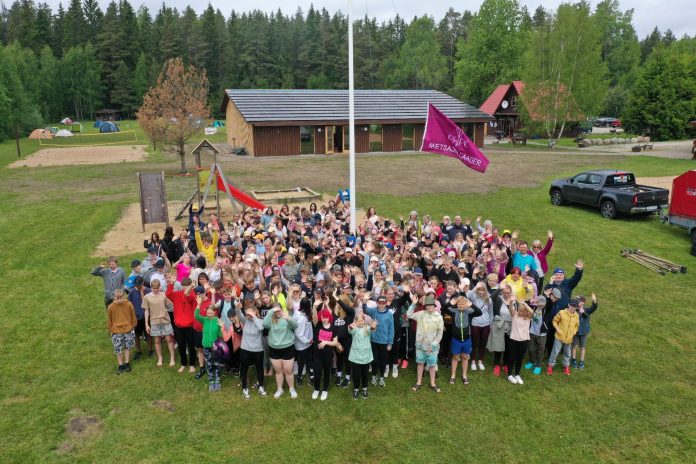For a transition to a green economy to take hold long term, involving youth is among the most important actions, as they will be the ones to carry on its values and practices and develop them further in the future. Working with youth in activities with an educational aspect on the principles and best practices of a circular economy, means nurturing a mindset that cares for the environment and creates abilities and skills for innovation all while economic activity is developed.
When considering the European Youth Goals, the Circular Based Waste Management project is in alignment with the goal for a Sustainable and Green Europe. Among other targets, the project aims to raise awareness on best practices among the populations of the municipalities it is working with and particularly among their youth.
One example from this summer has been the traditional spring camp of Paide Hammerbeck Elementary School at the Metsajõe recreation centre in Estonia. During the two-day camp, students enjoy living in tents and socializing with their peers as smartphones are prohibited. The main emphasis is on enjoying nature and direct communication.
The theme of the camp for this year was “Lets sort the trash”. The students were tasked with bringing reusable food containers, which they had to wash themselves in water barrels. In doing so, students learned how to save water and think about preserving nature.
Various workshops were prepared to introduce waste management to the students through practice, as Paide Hammerbeck Elementary is a school that invites practice. An example is, sorting garbage into different composters over time.
Older students were invited to perform a team landscape game. To this end, the teachers had prepared 40 questions on waste management. The students were divided into teams and they oriented themselves in the surrounding forest under the guidance of tablets and answered questions on points such as “How much household waste does each Estonian produce in an average year?“. In the evening, there were celebrations under a bonfire, with games, singing and a disco.
The next day, all students could take part in the firefighting Olympics. The most important thing about the entire camp was that different trash cans were put out for sorting the waste and everyone participating were watchful that the right waste item would end up in the right trash can. After the camp, the young people had to clean up the camp site and, as always, put all the waste in the right place.
Activities like these that encourage to be vigilant over how waste is disposed of, help ensure youth understand the importance of waste management but more importantly, they help develop behaviours and enable youth with knowledge on practices and tools to tackle waste issues. Small changes in daily habits, help enable to transition and fully implement a circular economy in the future, reaching the Sustainable and Green Europe goal.
Maritsa Kissamitaki, Karola Jaanof – Circular Based Waste Management


